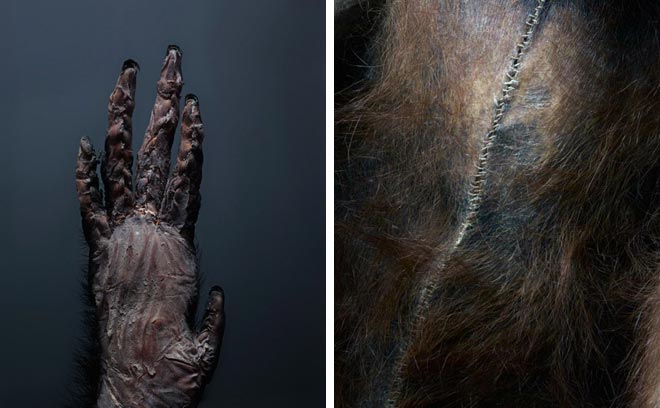
There’s a room in the U.S that’s so quiet it becomes unbearable after a short time. The longest that anyone has survived in the ‘anechoic chamber’ at Orfield Laboratories in South Minneapolis is just 45 minutes.
It’s 99.99 per cent sound absorbent and holds the Guinness World Record for the world’s quietest place, but stay there too long and you may start hallucinating.
{ DailyMail | Continue reading }
illustration { Suzanne Sattler }
noise and signals |
April 13th, 2012

Baboons have mastered one of the basic elements of reading - identifying the difference between sequences of letters that make up actual words from nonsense sequences.
Although the animals have no linguistic skills, they were able to classify a four-letter sequence as either a real word or a random sequence. These findings challenge the long-held notion that the ability to recognise words in this way - as combinations of objects that appear visually in certain sequences - is fundamentally related to language.
It now appears that when humans read, we are partly drawing on an ancient ability, predating the evolution of our own species.
Linguists agree that language is needed during reading, but at which stage language becomes a necessity has come under debate. Past research has shown that animals have the ability to discriminate letters from one another, but previously experts thought the ability to recognise words was dependent on an ability to understand language.
{ Cosmos | Continue reading }
photo { Robin Schwartz }
Linguistics, animals, science |
April 13th, 2012
In what is surely the most shocking celebrity revelation of 2012, Ashley Olsen has announced that she plans to focus on the fashion empire she’s created with her twin sister Mary-Kate. (…)
Olsen revealed that it’s finally time to step down from her position as Hollywood’s most respected A-lister performer.
Tragically for the millions who have long worshipped her brilliant talent and her status as the unparalleled master of character, accents, and genres, Olsen says that she’s never going to act again.
{ The Stir/Cafe Mom | Continue reading }
haha, showbiz |
April 13th, 2012

Pew research has a new survey showing that tablets and smart phones are now 27% of Americans’ primary news source. The overwhelming share of this is phones, not tablets; and a reasonable view says this will rise to 50% in three years. (…)
But it is also a depressing development, portending, once again, the end of the world as we know it: the news business has been plunged into a crisis because web advertising dollars are a fraction of old media money. And mobile is now a fraction of web: the approximate conversion rate is $100 offline = $10 on the web = $1 in mobile.
{ Guardian | Continue reading }
marketing, media, technology |
April 13th, 2012

In my new book Drop Dead Healthy, I try to become the healthiest person alive. In doing so, I examine hundreds of activities to determine if they are healthy.
Is meditation healthy? Yes. Petting dogs? Yes, because it lowers the blood pressure. Sitting? Definitely not. Going to a noisy restaurant? No. Taking naps? Thank God yes.
One of the few activities I didn’t discuss: Reading. Is reading healthy? Or will it slowly murder you?
No doubt I’m a bit biased, but I’ve come to the conclusion that overall, books are, in fact, good for your health. (…)
More and more research shows that sitting is bad for you. It significantly increases your chances of heart disease and slows your metabolism.
This is why, for my book, I ignored the siren call of my chair and did a lot of reading standing up. Reading on your feet burns about 34 more calories per hour than reading while sitting. Eventually, I took it further. I bought a treadmill, converted it into a desk, and did all my reading and writing while walking. It took me about a thousand miles to write the book.
{ AJ Jacobs/Omnivoracious | Continue reading }
books, guide, health |
April 13th, 2012
photogs |
April 13th, 2012

A few blocks later, Zupan wants to demonstrate what he calls “shy distance”: how close you get to an approaching person with whom you are bound to collide before one of you shifts to the side. The process is sometimes anticipated with a kind of foreplay, what Nicholson Baker in The Mezzanine described as “the mutual bobbings you exchange with an oncoming pedestrian, as both of you lurch to indicate whether you are going to pass to the right or to the left.” Scanning the sidewalks, Zupan announces, “I’m going to find someone who’s not looking at their phone. I usually try to find someone smaller than me.” He finds his mark: an ordinary commuter in Dockers and oxford shift, striding purposefully. Zupan puts his head down, and gets to within a few feet before the man breaks right, shooting back an irritated glare. (As Zupan wrote in Urban Space, “Pedestrians have been found to take evasive action anywhere from 2 to 17 ft ahead of a stationary or moving obstacle.”)
What might be for some the unchoreographed whir of the city is for Zupan a set of discrete patterns; if a pattern can’t be observed, it probably just means you haven’t looked long enough. Block by block, they emerge: The way people drift toward the shady side of the street on hot days; the way women (in particular) avoid subway grating on the sidewalk; the way walking speeds are slower at midday than before or after work; the way people don’t like to maintain the same walking speed as a stranger next to them. (…)
When do people choose to take the escalator versus the stairs? How crowded does the former have to be before the latter is chosen?
{ Slate | Continue reading }
photo { Paul McDonough, NY City, 1973-1978 }
photogs, psychology |
April 13th, 2012
photogs, taxidermy |
April 13th, 2012

According to what some call the strong definition of free will, articulated by René Descartes in the 17th century, you are free if, under identical circumstances, you could have acted otherwise. Identical circumstances refer to not only the same external conditions but also the same brain states. (…)
Contrast this strong notion of freedom with a more pragmatic conception called compatibilism, the dominant view in biological, psychological, legal and medical circles. You are free if you can follow your own desires and preferences. A long-term smoker who wants to quit but who lights up again and again is not free. His desire is thwarted by his addiction. Under this definition, few of us are completely free. (…)
Consider an experiment that ends with a 90 percent chance of an electron being here and a 10 percent chance of it being over there. If the experiment were repeated 1,000 times, on about 900 trials, give or take a few, the electron would be here; otherwise, it would be over there. Yet this statistical outcome does not ordain where the electron will be on the next trial. Albert Einstein could never reconcile himself to this random aspect of nature. (…)
This experiment was conceived and carried out in the early 1980s by Benjamin Libet, a neuropsychologist at the University of California, San Francisco. (…)
Intuitively, the sequence of events that leads to a voluntary act must be as follows: You decide to raise your hand; your brain communicates that intention to the neurons responsible for planning and executing hand movements; and those neurons relay the appropriate commands to the motor neurons that contract the arm muscles. But Libet was not convinced. Wasn’t it more likely that the mind and the brain acted simultaneously or even that the brain acted before the mind did?
Libet set out to determine the timing of a mental event, a person’s deliberate decision, and to compare that with the timing of a physical event, the onset of the readiness potential after that decision. (…)
The results told an unambiguous story, which was bolstered by later experiments. The beginning of the readiness potential precedes the conscious decision to move by at least half a second and often by much longer. The brain acts before the mind decides! This discovery was a complete reversal of the deeply held intuition of mental causation.
{ Scientific American | Continue reading }
photo { Tabitha Soren }
ideas, neurosciences, photogs |
April 13th, 2012

Scientists are increasingly finding that depression and other psychological disorders can be as much diseases of the body as of the mind. (…)
Scientists are finding that the same changes to chromosomes that happen as people age can also be found in people experiencing major stress and depression.
The phenomenon, known as “accelerated aging,” is beginning to reshape the field’s understanding of stress and depression not merely as psychological conditions but as body-wide illnesses in which mood may be just the most obvious symptom.
{ WSJ | Continue reading }
genes, psychology, science |
April 13th, 2012

The discovery [of the Higgs boson], if confirmed, will mark the culmination of a hunt that has taken years and cost billions of dollars, and will shape the field for years to come. (…) What fundamental discoveries in biology might inspire the same thrill? We put the question to experts in various fields. (…)
Is there life elsewhere? (…)
Is there foreign life on earth? (…) Some have postulated the existence of a ’shadow biosphere’ on Earth, teeming with life that has gone undiscovered because scientists simply don’t know where to look. It could contain life that relies on a fundamentally different biochemistry, using different forms of amino acids or even entirely novel ways of storing, replicating and executing inherited information that do not rely on DNA or proteins. (…)
How did life start…? (…) Joyce says that there will come a point at which researchers learn how to synthesize an evolving, replicating system from scratch. (…) Several labs have already made headway. (…) In 2009, a paper from Joyce’s lab reported the development of a system of RNA molecules that undergo self-sustaining Darwinian evolution5. But enzymes and a human hand were needed to create the RNA sequences to start off the reaction, Joyce says, and so far his lab has not found conditions that would allow the system to form spontaneously. “We’re still a bit challenged,” he says. “But the system is running more and more efficiently all the time.” (…)
… and can we delay its end? (…) Cynthia Kenyon and her colleagues at the University of California, San Francisco, reported that mutations in a single gene allowed the nematode Caenorhabditis elegans to live more than twice as long as usual. Three years later, a group led by Andrzej Bartke, who studies ageing at Southern Illinois University in Springfield, reported that mice bearing a single mutation that causes hormonal deficiencies live up to 68% longer than mice without the mutation. Both papers, and a slew of work since, have suggested that it might be possible to significantly slow human ageing and its associated diseases.
{ Nature | Continue reading }
image { Trevor Brown }
mystery and paranormal, science |
April 12th, 2012

Among the most surprising discoveries about memory has been the realisation that remembering a past event is not like picking a DVD off the shelf and playing it back. Remembering involves a process of reconstruction. We store assorted features of an event as representations that are distributed around the brain.
In simple terms, visual features are represented near the back of the brain in the areas specialised for visual processing; sounds in auditory processing regions close to the ears; and smells in the olfactory system that lies behind the nose.
To experience the rich, vivid “re-living” of a past event that is remembering, we fit these features together into a representation of what took place.
A lot of stuff happens in our lifetimes, and so it makes sense that our brains would have evolved some efficient memory strategies. We don’t try to remember every single event in its entirety. Instead, we store the elements of an event, and put them together in different ways to make different memories. The downside is that similar events that share a number of features may be more difficult to remember.
Our experiment was designed to investigate this effect.
{ Guardian | Continue reading }
artwork { Sougwen Chung | Thanks Tim }
memory |
April 12th, 2012
 Argentine hospital blamed after “dead” baby found alive.
Argentine hospital blamed after “dead” baby found alive.
The Federal Railroad Administration insists that all trains must be painted with an “F” at the front, so you can tell which end is which. Over-regulated America.
It is illegal in Massachusetts to deface a milk carton.
California town set to ban smoking anywhere outside… even in your own backyard.
Many Western states, including Utah, Washington and Colorado, have outlawed individuals from collecting rainwater on their own properties.
Final Stats On Heartland Payment Systems Class Action: $1,925 To 11 People, $600k To Lawyers.
U.S. filmmaker repeatedly detained at border.
The Miss Universe Organization announced today that it will begin allowing transgender women to compete in its annual beauty pageants starting next year.
Japanese ATMs to use palm readers in place of cash cards.
Today, half of U.S. residents are single, and a third of all households have one occupant.
Life expectancy may affect when you get married, divorced, have kids.
Can Men Be Trusted to Take Male Contraceptive Pill?
Study uncovers a possible positive effect of using multiple forms of media at the same time. Multitasking – not so bad for you after all?
Social rank alters gene activity in monkeys.
Excessive worrying may have co-evolved with intelligence.
How Wealth Reduces Compassion.
Women have to work harder than men in order to start sweating, while men are more effective sweaters during exercise.
Eating less fat and exercising are some of the most effective paths to weight loss success.
On 30 June 1908, a mammoth explosion in western Siberia flattened trees across more than 2000 square kilometres. The most common explanation is that an asteroid or comet exploded in the atmosphere, yet no extraterrestrial material has been found. Six mystery blasts.
How To Trigger A Volcanic Eruption On Purpose.
Their model suggests that new universes could be created spontaneously from apparently empty space. From inside the parent universe, the event would be surprisingly unspectacular. Does the Early Universe Harbor Evidence of Time Before the Big Bang?
Robot Helicopters To Single Out Pirate Ships.
Why Amazon Wants Your Old CDs.
Nothing is ever exactly as it seems in technology business and that certainly applies to AOL’s recent patent auction.
This sort of thing happens a lot, and a few years ago, Brooklyn law professor Jason Mazzone gave the phenomenon a name – “copyfraud.”
Vang Vieng, deep in the jungle of Laos, is a backpacker paradise where there are no rules. Last year at least 27 travellers died there, and countless more were injured.
For years before they caught him, the Italian police had no idea that Paolo Di Lauro was one of Naples’s most powerful crime bosses, running a drug and counterfeit-goods empire—and responsible for a peace his turf had rarely known.
 Beer taxes thus played a crucial role in financing the Dutch Revolt which led to the separation of the Low Countries and, eventually, the creation of Belgium. [PDF]
Beer taxes thus played a crucial role in financing the Dutch Revolt which led to the separation of the Low Countries and, eventually, the creation of Belgium. [PDF]
A parking chair is a chair that is used by a vehicle owner to informally mark a parking space as reserved for oneself.
Fuck your Cherner armchair. Fuck your toilet decal.
TransRatFashion: When we arrived in Rio we were struck by all the transvestites working the streets as prostitutes. We decided to use taxidermied rats, so I started to hunt down the rats.
He also happens to be the man responsible for bringing the bubbly saline injection-based forehead look to Japan.
Thermosaurus Radiator.
The USA Sunglasses by Jeremy Scott.
every day the same again |
April 12th, 2012

New scientific research raises the possibility that advanced versions of T. rex and other dinosaurs — monstrous creatures with the intelligence and cunning of humans — may be the life forms that evolved on other planets in the universe. “We would be better off not meeting them,” concludes the study, which appears in the Journal of the American Chemical Society. (…)
“An implication from this work is that elsewhere in the universe there could be life forms based on D-amino acids and L-sugars. Such life forms could well be advanced versions of dinosaurs, if mammals did not have the good fortune to have the dinosaurs wiped out by an asteroidal collision, as on Earth.”
{ ACS | Continue reading }
science, theory |
April 12th, 2012

Right before its billion dollar acquisition from Facebook, Instagram closed a $50 million Series B round from Sequoia, Josh Kushner’s Thrive Capital, Greylock and Benchmark at a $500 million valuation.
{ TechCrunch | Continue reading }
This will make you think: at its current, public market valuation, the New York Times company is worth about $50 million less than the $1 billion dollars that Facebook just paid for Instagram. (…) They could have bought the New York Times, and used the spare to fund Instagram’s entire last round.
{ The Next Web | Continue reading | Thanks Tim }
oil on canvas { Brendan Lott }
economics, media, technology |
April 12th, 2012

Thriving colonies disappear overnight without leaving a trace, the bodies of the victims are never found. It’s what’s happening to fully a third of commercial beehives, over a million colonies every year. Seemingly healthy communities fly off never to return. The queen bee and mother of the hive is abandoned to starve and die.
Thousands of scientific sleuths have been on this case for the last 15 years trying to determine why our honey bees are disappearing in such alarming numbers. “This is the biggest general threat to our food supply,” according to Kevin Hackett, the national program leader for the U.S. Department of Agriculture’s bee and pollination program.
Until recently, the evidence was inconclusive on the cause of the mysterious “colony collapse disorder” (CCD) that threatens the future of beekeeping worldwide. But three new studies point an accusing finger at a culprit that many have suspected all along, a class of pesticides known as neonicotinoids. (…)
Their vanishing is nature’s way of telling us that conditions have deteriorated in the world around us. Bees won’t survive for long if we don’t change our commercial breeding practices and remove deadly toxins from their environment. (…)
Germany and France have already banned pesticides that have been implicated in the deaths of bees.
{ Reuters | Continue reading }
collage { Matthew Cusick }
bees, horror |
April 11th, 2012
health |
April 11th, 2012

Natural selection never favors excess; if a lower-cost solution is present, it is selected for. Intelligence is a hugely costly trait. The human brain is responsible for 25 per cent of total glucose use, 20 per cent of oxygen use and 15 per cent of our total cardiac output, although making up only 2 per cent of our total body weight. Explaining the evolution of such a costly trait has been a long-standing goal in evolutionary biology, leading to a rich array of explanatory hypotheses, ranging from evasion of predators to intelligence acting as an adaptation for the evolution of culture. Among the proposed explanations, arguably the most influential has been the “social intelligence hypothesis,” which posits that it is the varied demands of social interactions that have led to advanced intelligence.
{ Proceedings of The Royal Society B | Continue reading }
brain, ideas, science |
April 11th, 2012






















